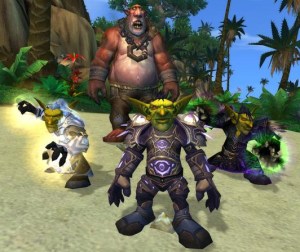World of Warcraft is the world’s most lucrative subscription-based massively multiplayer online game. Its 8 million subscribers all pay a monthly fee to play WOW, and that generates a significant amount of revenue for publisher Activision Blizzard.
This reliable source of income is slowly starting to dissolve, however, and now Blizzard might not have anything ready to take its place.
Yesterday, GamesBeat discovered that Blizzard reset development on its MMO followup to World of Warcraft. The developer will cut down the team working on the project, codenamed Titan, to just 30 core members who will start rebuilding the game.
“We’ve always had a highly iterative development process, and the unannounced MMO is no exception,” Blizzard head Mike Morhaime confirmed to GamesBeat in a statement Tuesday. “We’ve come to a point where we need to make some large design and technology changes to the game. We’re using this opportunity to shift some of our resources to assist with other projects while the core team adapts our technology and tools to accommodate these new changes. Note that we haven’t announced any dates for the MMO.”
Blizzard isn’t new to massive delays. The studio started working on its Diablo III action role-playing game in 2001. It only released that game in May 2012. Similarly, StarCraft II development began in 2003, and it didn’t debut until 2010. It’s likely that Titan, which was first rumored in 2006, won’t go live until 2016.
This leaves Activision in a precarious position.
 World of Warcraft is still the most successful MMO ever, but it is bleeding paying players. In May, the Activsion revealed that WOW lost 1.3 million monthly subscribers. It’s down to 8 million from a high of 12 million subscribers at its peak in early 2010. That is still more subscribers than any other MMO.
World of Warcraft is still the most successful MMO ever, but it is bleeding paying players. In May, the Activsion revealed that WOW lost 1.3 million monthly subscribers. It’s down to 8 million from a high of 12 million subscribers at its peak in early 2010. That is still more subscribers than any other MMO.
Previously Blizzard was able to maintain stable player numbers with expansions that generated lots of excitement, but the studio just released the last one, Mists of Pandaria, in September. During its most recent conference call with investors, Activision said it won’t have another expansion ready for a while, so it expects WOW’s numbers to fall even further.
“It isn’t clear that the WOW declines are persistent, and we might see subscribers stabilize,” Wedbush analyst Michael Pacther told GamesBeat. “However, if subs continue to decline, it could cost Activision quite a bit — perhaps 10 to 20 percent of net income — before the next MMO launches.”
World of Warcraft represents about $1 billion in yearly revenue for Activision Blizzard. It has come to count on that money for years, but WOW is past its prime. And while it’s possible that the MMO could ignite a fire in players’ hearts and regain a significant portion of the gamers it’s lost, it’s much more likely that a new game would do that.
Lopping nearly a billion dollars a year off of its revenues isn’t really an option. That is why Titan is so important to Activision — and that is also why it had to delay it.
“[Activision has to get] the next MMO right to allow them to grow its business, so any delays to ensure [Titan’s] quality are probably worthwhile,” said Pachter.
That’s exactly right.
Blizzard is one of the last studios running a major, subscription-only MMO game. World of Warcraft is a money factory that Electronic Arts and a number of other publishers failed to replicate. At this point, it seems that either WOW is a relic of another age in which customers were willing to pay a monthly fee, or the market can only support one massive subscription-based MMO at a time.
It’s likely that Blizzard is struggling with that question, but for the sake of Activision’s bottom line, the next game has to succeed. Whether that means it’s another sub-based MMO or some take on free-to-play, the company needs another big hit similar in scale to WOW.
Blizzard generates nearly all of its cash from just three properties, but as popular as StarCraft and Diablo are, they don’t produce numbers like WOW. The company even tried to introduce a lot of real-money elements into Diablo to make it more like its popular MMO. The epitome of those mechanics is Diablo III’s real-money auction house, which didn’t catch on and even turned off a lot of the series’ fans.
Activision really needs Titan to replicate WOW’s financial success, so if that means delaying Titan until it is perfect, that’s probably the smartest move it can make. Blizzard still generates a ton of buzz around its new games, so it’ll attract an audience. That means it just needs to develop something that can retain those users.
In the meantime, WOW is moving quickly toward retirement — and those are some legendary boots Titan will have to fill.
VentureBeat's mission is to be a digital town square for technical decision-makers to gain knowledge about transformative enterprise technology and transact. Learn More

